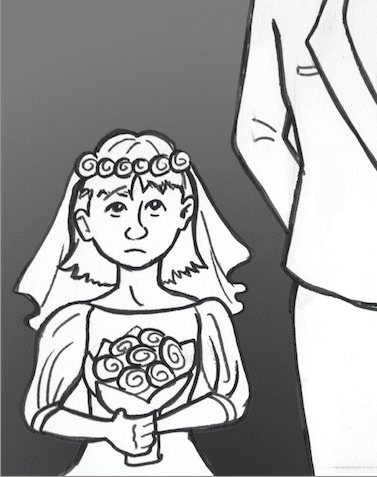Did you know that there are about 67 million child brides around the world in developing countries? Child marriage, a marriage union that takes place before an individual turns eighteen, is the nightmare turned reality of many young adolescents whose fates are determined both by cultural practices and other people.
Cultural practices, poverty and gender inequalities are the driving forces that sustain child marriage. In some cultures where women are considered inferior, the cost of raising daughters can become overwhelming and families choose to marry off their daughters to lessen the weight of their financial hardship. Other times these young girls are wedded to settle family debts. In some cultures where child marriage is practiced, bride prices and dowries hugely influence the time when families decide to marry off their daughters. The younger the bride, the higher bride price she can accumulate.
I suspect that life for these young brides and mothers is definitely no walk in a park. Because many of these girls marry at the tender age of 11 if not younger to someone about two to three decades older, any hope they have for a bright future is dimmed. Their education comes to an abrupt end so they can be fully engrossed in the responsibilities that come with being a wife and a mother. They are subjected to sexual and physical assaults and suffer deadly consequences of complications due to childbirth.
Child marriage is a harmful practice to the physical and mental well-being of these young brides. Physically, their early exposure to sexual activity and childbirth lead to sexually transmitted diseases such as HIV/AIDS, an increase in child and maternal mortality rate and other health-related risks. Mentally, these young girls are not ready for the taxing job of being a wife or a parent, as they themselves are barely teenagers. Although there are many harmful consequences that child marriage inflicts on children, specifically girls, child marriage continues to be practiced in many countries.
In United States society, where child marriage is not socially sanctioned, it has been statistically recorded that many Millennials are now delaying marriage and children to focus on their education. More women are choosing to get married in their 30s rather than in their 20s, or not at all. If developing countries were to follow this example and delay the average age of marriage, it would allow these girls to continue their education, reduce physical and mental health risks and allow girls to challenge the cycle of poverty and improve their quality of life. However, these young girls are stripped of their basic rights and are often unable to delay marriage and children. The child marriage tradition is so based in culturally-specific beliefs in female inferiority that preventing it from happening is next to impossible.
Child marriage is a tragedy that steals the vibrant spirit of so many young girls. It diminishes their worth and shuns them into silence and submission. Many young girls are later abandoned by their husbands and become single mothers trapped in a cycle of poverty. Governments should work to enforce laws to eradicate the practice of child marriage and save our potential leaders of tomorrow from a life of servitude.
Kafayat Akindele ’17 [email protected] is from St. Paul, Minn. She majors in psychology.
Graphic Credit: ERIN KNADLER/MANITOU MESSENGER



